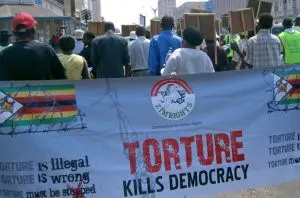
Wim Trengove SC, appearing for SALC and Zimbabwe Exiles Forum (ZEF), argued the merits of the applicants’ submissions today and what follows is a summary of th0se arguments. He began by noting that it was common cause between the parties that crimes against humanity had been committed in Zimbabwe and that that there had been a collapse of the rule of law there. Framing the case too is that the prohibition against torture is one of South Africa’s fundamental constitutional values, as recognised by the Supreme Court of Appeal, and that it is a crime that all states are required to prosecute.
He then proceeded to distill SALC’s case into three issues of law, and five grounds for review. On the law, the issues were: the applicant’s standing; the applicability of the principle of legality to the case; and the applicability of the Promotion of Administration of Justice Act (PAJA) to the case. The five grounds for review: when the respondents say they had no power to investigate international crimes committed in Zimbabwe they make a mistake of law; when they say they have no duty to investigate they make a mistake of law; when they say that SALC’s dossier contains insufficient evidence to trigger an obligation to investigate they make a mistake of law; when they say they couldn’t gather evidence themselves in Zimbabwe this was not an excuse to not do such investigation as they could and this too was a mistake of law; and when the respondents say that an investigation would negatively impact on the relationship between Zimbabwe and South Africa they demonstrate that they took into account wholly irrelevant considerations in making their decision.
On the issue of standing the law is clear. A slew of case — from Ferreira to Biowatch — support the proposition that NGOs dedicated to constitutional values which are litigating in the public interest for those constitutional values to be upheld should not be denied standing. In addition the respondents concede in their papers that SALC has an interest in having a proper decision made and having conceded that interest can’t now contest our standing.
One of the best quips of the day was made by Judge Fabricius at this point, who noted that torture victims have no voice in Zimbabwe; on the respondents’ version, they would have no voice in South Africa either and the applicants too would be denied a voice.
Judge Fabricius appeared to accept that the principle of legality applied to the case, indicating to Wim Trengove that there was no need to address him on this point.
On the applicability of PAJA to the respondents’ decision, Trengove referred to a number of cases indicating that the question at issue is whether the decision, even if only provisional or preliminary, has an effect and that with applications — as with SALC’s submission of the dossier to the PCLU/NPA — it is enough that the decision, which is subject to review, determines rights and not that it necessarily violates rights.
It was submitted to the court today that the respondents’ position that they did not have the power to investigate was erroneous. They had both the power and duty to do so in terms of the relevant applicable legislation. South Africa’s ICC Act is very clear that international crimes contained in the Rome Statute — genocide, crimes against humanity, war crimes — are crimes under SA law whether committed in SA or beyond its borders. At the time SALC submitted its dossier to the PCLU/NPA, the Scorpions were in existence within the NPA and had such investigative powers as would have allowed them to investigate. At the very least, the PCLU/NPA might have requested that the police investigate. In essence this was the recommendation made by Anton Ackermann, head of the PCLU, and evidenced in his afidavit admitted to court yesterday when he disclosed that he recommended to his superiors within the NPA that an investigation be initiated.
As to sufficiency of dossier, Ackermann’s views that dossier should be investigated must hold sway. Furthermore, supporting affidavits which the respondents put up appear to conflict: with some criticising the dossier for containing insufficient detail; others for too much. The respondents in their heads also appeared to misunderstand the ICC’s jurisprudence on the different thresholds applicable to ddifferent stages of investigation/prosecution. For an investigation to be initiated it is sufficient that there is ‘reasonable suspicion’ and in their papers respondents appear to have conceded that SALC’s dossier met this standard.
The respondents could also not rely on the likelihood that they themselves would be unable to gather evidence in Zimbabwe as a reason not to investigate. They could have undertaken other investigation, such as re-interviewing victims of the torture.
Respondents also sought to rely on the potential prejudice the investigation might cause for SA/Zimbabwean relations as a reason not to proceed with investigation. Particular potential prejudice identified by the respondents included that SA might one day lose its chance to chair the SADC police chiefs forum on the basis of this investigation. Applicants’ counsel underlined that the argument was not that foreign policy considerations should never be a consideration. But in this case, those who would be ‘miffed; are the torturers or those complicit in the torture. Trengove referred to authoritative Canadian jurisprudence to the effect that comity, while important, must end where international crime begins.
This entry was posted in International Criminal Justice. Bookmark the permalink.




